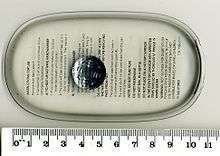Hand warmer
Hand warmers are small (mostly disposable) packets which are held in the hand and produce heat on demand to warm cold hands. They are commonly used in outdoor activities. Other types of warmers are available to provide soothing heat for muscular or joint aches.
Depending on the type and the source of heat, hand warmers can last from 30 minutes (recrystallisation) up to 24 hours (platinum catalyst).
Created by Japanese inventor Niichi Matoba. Matoba received a patent for applying the principle of an oxidation reaction that produces heat by means of platinum catalysis. He then devoted his time to researching how to make the product suitable for practical use. In 1923, he manufactured a prototype of his device naming it HAKUKIN-kairo (HAKKIN warmer). A version of these original portable hand warmers is still produced in Japan.
Types
Air activated (iron)
Air activated hand warmers contain cellulose, iron, water, activated carbon, vermiculite (water reservoir) and salt and produce heat from the exothermic oxidation of iron when exposed to air. They typically emit heat for 1 to 10 hours, although the heat given off rapidly diminishes after 1–2 hours.[1][2] The oxygen molecules in the air react with iron, forming rust. Salt is often added to catalyze the process.[3]

Supersaturated solution (crystallisation-type)
- See also: Sodium acetate#Heating pad
Hand warmers can be recharged by immersing the hand-warmer in very hot water until the contents are uniform and then allowing it to cool. The release of heat is triggered by flexing a small metal disk in the hand warmer, which generates nucleation centers that initiate crystallisation. Heat is required to dissolve the salt in its own water of crystallisation and it is this heat that is released when crystallisation is initiated.[4]
The latent heat of fusion is about 264–289 kJ/kg.[5]

This process can be scaled up to provide a domestic heating store developed by Sunamp Scotland[6] [7]
Lighter fuel
Lighter fuel hand-warmers use lighter fluid (petroleum naptha). These can be re-used by simply refuelling. Typical models can generate heat for either half a day or a whole day, depending on conditions.
Battery
Battery operated hand warmers use electrically resistive heating devices to convert electrical energy in the battery. Typically hand warmers can survive for 6 hours or less, with heat outputs from 40-48C. The Rechargeable Electronic Handwarmers can be charged from a mains power supply or from a 5V USB power supply, with 500 recharge cycles indicated.
Charcoal
Charcoal hand-warmers provide heat by burning charcoal in a special case. These can last up to 6 hours and become comfortably hot. Charcoal cases for these usually have felt on the outside and have items in it that don't produce heat, but spread the heat such as metal. A charcoal hand warmer can start heating when both ends of charcoal are striked and then extinguished to create a hot charcoal. The smouldering stick is then placed inside the case. The charcoal sticks are available from most outdoor activity shops and are fairly inexpensive.
See also
- Instant cold pack
- Heating pad
- Hot water bottle
- Muff (handwarmer), a fashion item
- Kanger, a Kashmiri version of a portable personal warmer
References
- ↑ "Warmer Hands (And Toes) Through Chemistry". ScienceIQ.com. Retrieved 2007-09-03.
- ↑ Handwärmer: Warme Hände, heisser Kopf
- ↑ "How Hand warmers work". February 2, 2014. Retrieved December 31, 2016.
- ↑ "How do sodium acetate heat pads work?". HowStuffWorks. Retrieved 2007-09-03.
- ↑ Ibrahim Dincer and Marc A. Rosen. Thermal Energy Storage: Systems and Applications, page 155
- ↑ BBC Scotland 2017-06-08 From hand-warmer to house-warmer for tech firm
- ↑ Sunamp company site